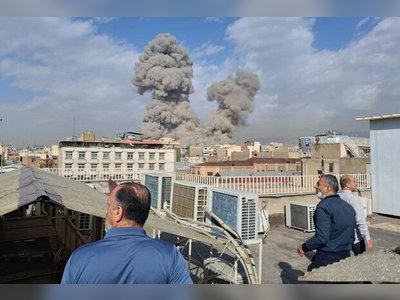
Coronavirus outbreak in Roumieh Prison, over 250 cases detected
Lebanon’s largest prison has registered 228 coronavirus cases among inmates and 25 cases among security personnel, an Interior Ministry source told The Daily Star Wednesday.
Roumieh Prison houses more than 3,000 prisoners, with cells holding triple their capacity, and has long been infamous for the poor conditions in some of its blocks. There is also little health care and medicine available for prisoners.
The source said infected prisoners were transferred to an empty building to quarantine, stressing that the situation was “under control.” Security personnel are quarantining in their homes.
According to the source, coronavirus prevention measures were set up in the prison when the virus was first detected in Lebanon on Feb. 21, in coordination with UNDP, the World Health Organization and the International Red Cross.
The Health Ministry could not be immediately reached for comment.
Inmates rioted Sunday night after infections were detected among a small number of inmates and security personnel. The riots mainly occurred in Block B of the prison compound, with videos showing prisoners protesting the poor health conditions in the facility.
The head of the Beirut Bar Association, Melhem Khalaf earlier this week said conditions at the prison equate to a "humanitarian time bomb," and advised the government to take "urgent measures" against the spread of the virus. Khalaf called on the judiciary to order "some releases, except in cases of egregious crimes and terrorism."
Prisoners have long demanded a General Amnesty law be passed for petty crimes including drug possession and involvement with hard-line groups. The prison for years has witnessed hunger strikes and riots by inmates.
The long-awaited General Amnesty bill has faced obstacles, mainly over insistence by Hezbollah and the Amal Movement that “Israel’s agents,” or Lebanese who collaborated with Israel should not be covered in the pardon proposal.
Lebanon has witnessed an alarming surge of coronavirus cases in the country over the last two months, with 25,449 cases registered since February.
The country is already grappling with the worst economic crisis since the Civil War and a fragile health sector that has been further overwhelmed by the devastating Aug. 4 Beirut Port explosion.
The source said infected prisoners were transferred to an empty building to quarantine, stressing that the situation was “under control.” Security personnel are quarantining in their homes.
According to the source, coronavirus prevention measures were set up in the prison when the virus was first detected in Lebanon on Feb. 21, in coordination with UNDP, the World Health Organization and the International Red Cross.
The Health Ministry could not be immediately reached for comment.
Inmates rioted Sunday night after infections were detected among a small number of inmates and security personnel. The riots mainly occurred in Block B of the prison compound, with videos showing prisoners protesting the poor health conditions in the facility.
The head of the Beirut Bar Association, Melhem Khalaf earlier this week said conditions at the prison equate to a "humanitarian time bomb," and advised the government to take "urgent measures" against the spread of the virus. Khalaf called on the judiciary to order "some releases, except in cases of egregious crimes and terrorism."
Prisoners have long demanded a General Amnesty law be passed for petty crimes including drug possession and involvement with hard-line groups. The prison for years has witnessed hunger strikes and riots by inmates.
The long-awaited General Amnesty bill has faced obstacles, mainly over insistence by Hezbollah and the Amal Movement that “Israel’s agents,” or Lebanese who collaborated with Israel should not be covered in the pardon proposal.
Lebanon has witnessed an alarming surge of coronavirus cases in the country over the last two months, with 25,449 cases registered since February.
The country is already grappling with the worst economic crisis since the Civil War and a fragile health sector that has been further overwhelmed by the devastating Aug. 4 Beirut Port explosion.










